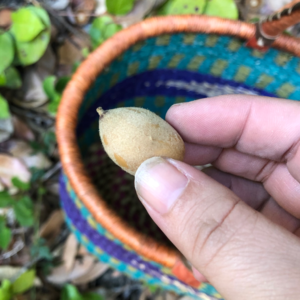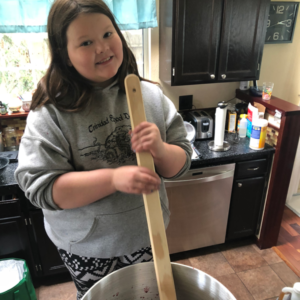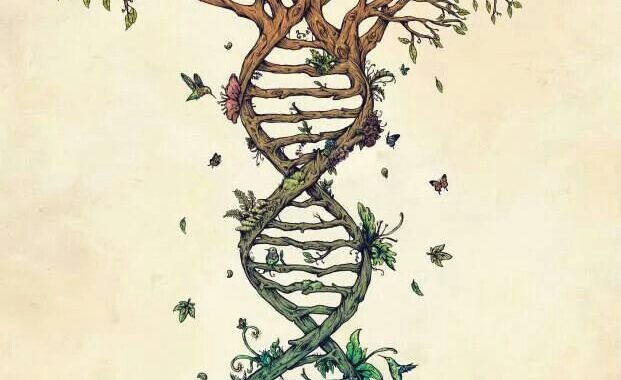
Reviving Relationships with Our Foodways
A History of Indigenous Food Sovereignty in California and Beyond.
by Cutcha Risling Baldy, Ph.D. & Kaitlin Reed, Ph.D., Co-Directors of the Native American Studies Food Sovereignty Lab at Humboldt State University

At the heart of food sovereignty is the self-determination of individuals, communities and groups over their food systems. The Declaration of Nyéléni (Ni-ye-leni) defines food sovereignty as “the right of peoples to healthy and culturally-appropriate food, produced through ecologically sound and sustainable methods, and their right to define their own food and agriculture systems.”
There are six principles of food sovereignty:
- Focusing on food for people
- Valuing food providers
- Localizing food systems
- Making decisions locally
- Building knowledge and skill
- Working with nature.
Food sovereignty is also about centering Indigenous voices in how we collectively move forward in building sustainable food systems. Indigenous scholars Devon Mihesuah and Elizabeth Hoover write that “The concept of Indigenous food sovereignty is not focused on only rights to land, food, and the ability to control a production system, but also responsibilities to and culturally, ecologically, and spiritually appropriate relationships with elements of those systems.” Therefore, the revitalization of traditional food sources through Indigenous food sovereignty is critical to how we build food sovereignty in our region and beyond.
FOOD IN RIGHT RELATIONSHIP
Throughout California, but especially in Northern California, Native peoples maintain strong relationships with their traditional food sources. Traditional Native food systems, ecological practices, and Indigenous scientific knowledges included very sophisticated, well thought-out and complex food systems that required ongoing ecological management.
In California there are several clear examples of how California Indian people practiced a complex system of food management that not only considered ongoing sustainability but also created an ecological abundance. For example, cultural burning was a practice that prevented catastrophic wildfires while also dramatically increasing food production systems, and supported cultural practices like basket weaving.4 There are several documented examples of explorers writing about California as looking like a “well-tended garden” and also noting how the landscape was shaped significantly by California Indian ecological practices.
In this region, there have always been movements and efforts to maintain food sovereignty by tribal nations. Our region is vibrant with Native programs, organizations, and leaders who have built leading Food Sovereignty movements around salmon, acorns, traditional gardens, and “Cooking Healthy in Indian Country.”

BALANCE DISRUPTED
When colonialism invaded California, settlers attempted to not only kill and remove Native peoples, they also supplanted ecological management which dramatically reduced food production that Indigenous peoples were dependent upon.
During the Spanish Mission system, Padres outlawed Native people from eating their traditional foods. The separation of Indigenous peoples from their foods was thought to be a way of civilizing and controlling Native peoples. They also forced Native peoples to labor in agricultural fields, removing native plants and replacing them with crops like grapes (for wine) and corn. Refusing to labor for the mission often resulted in being whipped or put into stocks or other violent punishments. There are even stories of some missions facing starvation because of the overreliance on growing nonnative foods and the refusal of the Padres to allow Native peoples to provide for all people in the missions by utilizing acorns. Padres said that they would rather people starve than eat these Indigenous foods.
The Gold Rush was one of the most violent times in California history and resulted in a 90% reduction in the California Indian population. The state of California supported an attempted genocide of Indian people by legalizing the enslavement of Indian people and also authorizing a California volunteer militia to kill Native peoples. Each region of California was allowed to set their own price to pay for the scalps and heads of Native Americans, with several regions setting prices at numbers like $5 per head or 25 cents per scalp.
The Act for the Government and Protection of Indians (1850) allowed for the enslavement of Native peoples as “apprentices.” Humboldt County records reflect that most people enslaved under this law were girls aged 7-12. This system of slavery made it dangerous for Native people to practice their foodways. At a point, it was too dangerous to go out and gather or to try and pass on this knowledge intergenerationally because our women and children were being targeted for kidnapping and enslavement.
When we think about the adaptations and sacrifices that Native people had to make to navigate these periods of time we must remind ourselves that our disconnection from traditional foods was not because we “lost” our culture or our knowledge, this disconnection was because of violence. These knowledges were violently wrested away from us by colonization.
U.S. Government practices of attacking food sovereignty as a way to forcibly remove Native peoples from their land continued across the nation. George Washington, referred to by the Haudenosaunee as “town destroyer,” was known for his “scorched earth” policy where he ordered agricultural fields of the Haudenosaunee destroyed and the earth burned so that crops would not be able to thrive in the region. The U.S. Government ordered the mass killing of buffalo in an attempt to weaken and starve Native peoples in the Great Plains. In California, the Bureau of Indian Affairs commissioned a report to discuss how they could eradicate oak trees in the hopes of destroying California Indian connections to acorns because it continued to be an important staple food.
Native peoples, as a result of being forced onto reservations, were put onto government rations, and in some cases those rations would be withheld from tribes who resisted the continuing encroachment of the U.S. Government.
The state then imposed educational systems, like boarding schools, which forcibly took Indian children away from their families and tried to assimilate them by separating them from their cultural practices and cultural foods.
The passage of the Dawes Act in 1887 tried to force Native peoples to give up communally owned land for individual property ownership. It also attempted to force Native peoples to practice western style farming and agriculture. The destruction of food sovereignty continued through environmental changes like the damming of rivers and flooding of Native lands, and polices like removal, allotment and relocation.
Indigenous land dispossession was how the State of California was able to become one of the leading economies in the world. This land dispossession prevents Native people from accessing their food sources to this day. Native lands were taken via policies like the creation of national and state parks which continues to prevent Native people from accessing foods, cultural materials, and sacred sites. When we talk about reclaiming our foods it is not just about the food, it is also about reclaiming stories, languages, cultural practices, and our connection to our lands.

INDIGENOUS-LED RESTORATION
Our food sources are currently under attack – like our salmon relatives who are threatened by water seizures and proposed water infrastructure projects. The COVID-19 pandemic also illustrated how precarious the food system within our local Native land regions continues to be.
The Klamath Basin Tribal Food Security Project found that 92% of Native American households in the Humboldt/Del Norte regions are food insecure and 70% never or rarely have access to Native foods. 64% of Native households rely on food assistance and 84% worry about their next meal.
As we work for the ongoing food sovereignty of our tribal peoples it is because our communities have been targeted for exploitation both historically and through contemporary practices. Rural and poor communities, like tribal groups, have less access to healthy foods and often face some of the highest rates of diabetes and other health issues in the nation. Food sovereignty is not only about reconnecting to our knowledges and practices; it is also an issue of environmental and social justice. Our traditional food knowledges can help us to build stronger futures.
What you see today in our region is a reconnection. We’ve been fighting this fight for food sovereignty for over 150 years by continuing to carry our knowledges forward despite the many attempts to destroy us and our connections to our lands and foods.
- The Potawot Community Food Garden at United Indian Health Services supports youth and elders with plant giveaways, access to organic vegetables, and harvest celebrations.
- Blue Lake Rancheria has developed a community garden, which produces foods used in the Tribe’s meal programs and restaurants.
- The Yurok Tribe recently founded their own Food Sovereignty Division which develops culturally relevant programs, policies and initiatives (see page 26).
- The Klamath-Trinity Resource Conservation district – the first tribal resource conservation district in California – is leading the way on food sovereignty practices in the Hoopa Valley.
- We are also pleased to announce the development of the Native American Studies Food Sovereignty Lab & Cultural Workshop Space at Humboldt State University. This will be a leading institute of research and collaboration to build the next generation of food sovereignty in our region and beyond (read more).
Learning about food sovereignty teaches us how and why relationships to our food sources and systems are fundamental to the existence of people and nature. Internationally renowned Native American scholar and activist Winona LaDuke states “Food sovereignty is an affirmation of who we are as indigenous peoples and…one of the most surefooted ways to restore our relationship with the world around us.”
We believe that reviving our relationship with food and food sovereignty will enable us to rebuild that relationship and look forward to the many ways we can continue to support this work in our local communities.
. . . . . . . . . . . . . . . . . . . . . . . . . . . . . . . . . . .
Dr. Cutcha Risling Baldy (she/her) is the Department Chair and Associate Professor of Native American Studies at HSU and a Co-Director of the NAS Food Sovereignty Lab & Cultural Workshop Space. She is Hupa, Karuk and Yurok and enrolled in the Hoopa Valley Tribe.
. . . . . . . . . . . . . . . . . . . . . . . . . . . . . . . . . . .
Dr. Kaitlin Reed (she/her) is an Assistant Professor of Native American Studies at HSU and a Co-Director of the NAS Food Sovereignty Lab & Cultural Workshop Space. She is Yurok, Hupa, and Oneida and enrolled in the Yurok Tribe.
. . . . . . . . . . . . . . . . . . . . . . . . . . . . . . . . . . .
| Food is Good Medicine by Jude Marshall (Hupa, Karuk, Yurok) We pray for it, we work for it, we dance for it. Laughter and tears all bundled up. Bringing it all back in a good way. Fasting with love, eating with joy. Sowing good feelings in all that we do, Feeding the people. Weaving knowledge, belonging, and hope, One strand at a time. The Potawot Community Food Garden is located at United Indian Health Services in Arcata, CA. The community educational garden is a 3-acre plot that provides organically grown vegetables, fruits and native herbs. The Potawot Garden distributes food to the UIHS community via Kay-woi Garden Membership and a bi-weekly Farmers Market. Believing that “food is good medicine,” the Potawot Community Food Garden welcomes volunteers to help work in their garden to lift up and inspire the health of its community. Call 707-826-8476 for more information about volunteering. |


